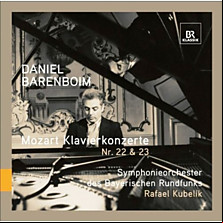BBC Review 1bj6o
Two superb performances from one of the world’s true greats.
Daniel Ross 2010
In his many writings about music, Daniel Barenboim describes how emotion cannot be expressed in music without first understanding it, that to truly affect an audience you must use your technical tools to their utmost effect. This recording of two Mozart piano concertos (written in Krakow and Paris respectively, in a period of intense prolificacy) displays these ideas quite plainly, even though they were recorded in 1970 and relatively early in his career, before he was even 30 years old.
Barenboim, while revered at the time, was yet to achieve the success that he’s now famous for, but there’s an incredible fastidiousness evident here. When, in the second movement of Nr. 22, it would be easy to skip through the linking ages and cadenzas, Barenboim’s rubato playing is deliciously tempered. He ekes out all possible emotional without it becoming cloying, masterfully displaying his interpretative powers. He calls on the Symphonieorcherster des Bayerischen Rundfunks in a confidently authoritative style, making the smallest gestures possessive of the most dramatic power.
Strangely, the third and final movement hardly begins with riotous relish. It is restrained, even meek when Mozart decides to restate his themes towards the end; but under Barenboim’s fingers the momentum is defiantly denied until the very end. While it’s brave and, some might argue, foolish to deny the audience its gratification for quite such a long time, it certainly says something about the bravado of this young performer. If you can be bothered to make the effort (and you should be), it’s a jolly old climax, and wholly worth waiting for.
It is a slight let-down, then, that the high standard is not quite upheld for the second concerto on this still-stellar disc. Even if it’s not quite as charged, dense and rewarding a concerto as the first, Nr. 23 and the interpretation of it still harbour some pleasant intricacy. The interplay between piano and clarinet in the first movement, the sublime transition between the first and second movements and the hammering exuberance of the finale are all wonderful, but broader artistic strokes are drawn, and Barenboim has more work to do with a lesser piece.
Ultimately, criticising Barenboim’s work in such a hungry performance period for him is like having too many fivers to fit in your pocket – missing the point, somewhat. Captured here are two superb performances from one of the world’s true artistic greats on attentive and explosive form.



